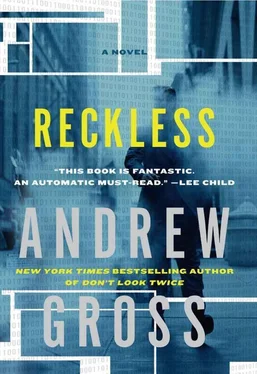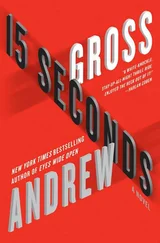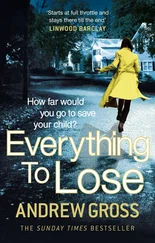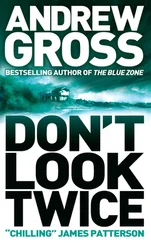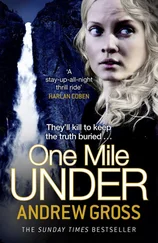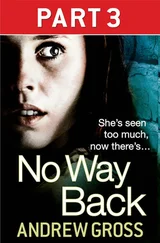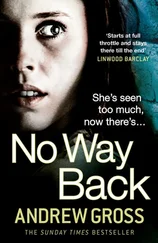“No.” She played with a string of brown pearls around her neck. “Just some things going on.”
He stared at her, waiting to see if she was comfortable explaining.
“Nothing you want to know, Ty.”
“Actually, I thought that’s what this was all about. Marc…?”
“No.” She shook her head and smiled, as if with amusement. She cupped her hands around her tea and took a breath. “Okay. You asked for it. Agoraphobia. You know it?”
“Fear of going out?” Hauck said.
“Fear of going out. Fear of attachment. Fear of abandonment. Fear of fucking fear.” She looked at him, hesitating, almost as if she was afraid she had disappointed him. “It’s not that I’m fearful of the world. It’s not like that with me. It’s part of the depression thing. Sometimes it’s like there’s just this weight that pushes on me. I don’t feel connected to anything. I have to force myself just to go out. Just to take my daughter to school.”
“Tell me.”
She pushed her long, sandy hair out of her eyes. “You’re sure you’re into this?”
He nodded. “Yeah.”
She exhaled. “Okay. It goes back. I grew up in a small town in Virginia. Where I got my accent from, in case you hadn’t noticed. Actually grew up riding a horse. Did competitions. My dad, who was a local lawyer, taught me how to shoot a shotgun before I knew how to braid my hair. I loved my dad,” she said, eyes beaming. “He was like Atticus Finch to me, Ty. You know what I mean? Everyone in town looked up to him.
“My mom-maybe at one time she was a capable person, but by the time I remember she was simply a country-club drunk. Everything was always an effort for her. Parties. Why she couldn’t make it to my riding events. Just getting dinner on the table. My dad, he was the glue that held everything together. Everything.”
“I know what you mean,” Hauck said, though his own dad, who worked for the Greenwich Department of Water for thirty years, was a million miles away from that.
“Do you?” April said. “When I was sixteen, I pulled my VW into the garage, grabbed my books from the passenger seat, and saw my father lying there…” Her jaw grew tight. “Sitting there against the wall, like he was wondering what shirt to wear, except there was this bright red pattern sprayed against the plaster behind his head. His shotgun was in his lap. Like he wanted me to find him there.”
Hauck reached for her hand. “I’m sorry. You don’t have to go back over-”
“You wanted to know, right? You wanted to know what makes me tick. Anyway, that’s not it. That was a long time ago. Just backstory, as they say. Bank fraud,” she said in response to Hauck’s questioning eyes. “He’d been receiving kickbacks from a local bank where he was directing business. During the big S and L crisis. The thing was ripe with fraud and my father was a part of it.” She chuckled bitterly. “Atticus Finch…I guess you can add fear of being let down to the list as well. Anyway, I ended up at UVA. I majored in art. Did a year of grad school at NYU. You ever hear of the Minimalist movement?”
He shook his head. “Can’t say I have.”
“Sol LeWitt. He did these amazing wall drawings. Richard Tuttle. That was my thing. I studied under Richard Dunn, who was the big cheese in that world. Sort of studied under him. More like I ended up perpetually under him. He was forty-two. I was twenty-three. I always was attracted to older guys. You getting the picture? Anyway, Richard”-April shook her head-“whatever scant trust or faith in myself had managed to make it through to that point, well, he took care of the rest. He was a pompous, spiteful bastard, but he had a long ponytail and everyone in the art world bowed down to him. I spent three years with him. I think he was screwing anyone who knew Rembrandt was Dutch.”
“I thought he was Flemish.” Hauck grinned.
“Well, then you’d have had nothing to worry about.” April laughed. “And believe me, I think he was into that too. Finally I had to just leave the whole program. Dropped out. I stayed in a friend’s apartment for about three months. Lost about twenty pounds. Not sure I ever went out. Read the Upanishads cover to cover. Got involved in a bunch of self-actualization things. I finally took a job selling ad space for this financial magazine. That’s where I met this nice, sort of square, something-a-little-cute-about-him-somewhere guy who was into complex investment models and standard deviations from the mean”-she smiled-“but who I knew wouldn’t let me down and seemed to think I was the most beautiful woman in the world.”
“Marc?” Hauck said, smiling.
She nodded.
“Did he know Rembrandt wasn’t Flemish?”
She chuckled. “I just didn’t want to be hurt again.” There was a shimmering in her wide, round eyes. “It wasn’t like there was this great love. He’s just the most stable man I ever met, and I didn’t want to be let down.”
“But you built a life.”
“Yeah.” She nodded brightly, happily. “We built a life. I have a beautiful little girl and a husband who gets up in the middle of the night like clockwork to check his overseas positions. We live in a fancy home. And go on nice vacations. I help out at Becca’s school.” She rotated her cup. “It’s just…It’s May. There are days it just comes and goes. I found my dad the first week of May. It’s always a rough time.” She shrugged and smiled. “See, for me, when you say ‘happy,’ I say that’s just a piece of time I don’t see my father’s face in that garage.”
Hauck looked at her across the bench. He squeezed her on the shoulder. “I won’t let you down.”
“No…” April smiled. “You wouldn’t, would you?” She covered his hand. “That’s why it’s nice being with you. Like I said, you’re just a guest at the old spa-not a resident.”
“You don’t have to be a resident either, April. Look at how you’ve helped me.”
April glanced at her watch. Her eyes grew wide. “Good Lord, I have to go. Becca’s got dance tonight. What kind of mother am I, going on so long with such a cute guy…” An idea seemed to hit her. “You know what we should do?”
“What?” he asked.
“We should take a picture. I have a camera here. You and I.”
“A picture?”
She shrugged. “You never know, one day that might be all we have.”
“That won’t happen,” Hauck said, “but sure…”
She dug into her purse, and as she did, it pushed her sleeve up, accidentally exposing her arm. April had always kept them covered.
Hauck’s gaze went to it. A bit in shock-a bit in sadness too.
There were marks. Several short slashes up her arm. Most appeared to have long since healed, but one or two still looked fresh and bright. He suddenly realized why.
His eyes lifted to April’s.
She smiled at him, as if her secret was now out. “So now you know…”
The phone that they removed from Sonny Merced’s body led to a sister in California who hadn’t spoken to him in months; a sometimes girlfriend who claimed she never wanted to see him again; a phone-in sex line; and a number that had been dialed just minutes before the attack, which led to a Michael Cassidy in Union, New Jersey. Who turned out to be a twelve-year-old kid, who, a week before, had lost his phone. Merced’s address was a post office box, the account for which was two months delinquent.
Merced was an ex-army ranger with the Eighty-second Airborne unit who had been drummed out of the service and had been an unindicted suspect in three rape investigations while over in the Middle East. He had an expired Michigan license and had been picked up twice in the past year on assault and drug possession charges. He had made a call to Cassidy’s stolen line minutes before attacking Jared and the police had found no unclaimed car in the rink lot afterward.
Читать дальше
Конец ознакомительного отрывка
Купить книгу
